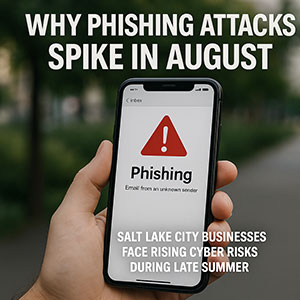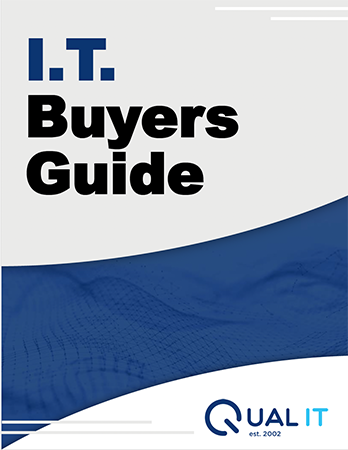 Salt Lake City financial advisors face heightened cyber threats during late summer
Salt Lake City financial advisors face heightened cyber threats during late summer
While you're wrapping up client retreats, onboarding interns, or easing back in after a family vacation, cybercriminals are ramping up. According to reports from Check Point and ProofPoint, phishing attacks reliably surge during the summer months—especially in late July and August.
For financial advisors in Salt Lake City, this isn’t just an IT issue—it’s a compliance risk. A single wrong click could expose confidential financial records, disrupt CRM access, or worse, trigger an SEC audit.
Why the Risk Is Higher for Advisors in Summer
Check Point Research noted a 55% increase in travel-related phishing domains between May 2024 and May 2025. That includes spoofed versions of hotels, airlines, and platforms like Airbnb. But it doesn't stop at vacations.
August is also back-to-school season. Many phishing campaigns now mimic universities, targeting advisors or staff pursuing graduate degrees or professional certifications. Even if these emails land in personal inboxes, employees often check them on firm-issued devices—and that’s all hackers need.
At firms where hybrid work is common and secure access is a must, phishing emails are now engineered with alarming precision. With AI tools, cybercriminals can craft highly realistic messages that look like routine communications from wealth tech vendors or compliance portals.
How Salt Lake City Financial Firms Can Stay Protected
AI has made it easier for hackers to impersonate legitimate contacts—but it’s also given your firm smarter tools for defense. The key is combining training with proactive IT services in Salt Lake City that understand the financial industry's nuances.
Key steps to prevent phishing attacks at your firm:
- Stay alert for convincing messages. Modern phishing emails aren’t riddled with typos anymore. Check sender addresses, subject lines, and link URLs for signs of impersonation.
- Never click on email links without verifying. Whether it’s a hotel invoice or an MFA request, go directly to the source instead of trusting the email link.
- Use Multifactor Authentication (MFA). If someone gets a password, MFA makes it harder for them to gain full access.
- Secure your endpoints. Ask your IT provider about Endpoint Detection and Response (EDR). These tools monitor advisor workstations and CRM systems for signs of phishing activity.
- Avoid personal email on company devices. Keeping financial systems isolated from personal behavior minimizes breach exposure.
- Watch for public WiFi traps. If you're logging in from a conference or coffee shop, always connect through a VPN.
Don’t Let Your Guard Down Just Because It’s August
Salt Lake City financial advisors can’t afford to be reactive with cybersecurity. Between evolving phishing tactics and rising SEC expectations, staying ahead means being proactive.
At Qual IT, we provide managed IT services and cybersecurity support specifically designed for Salt Lake City financial firms. We understand your tech stack, your compliance obligations, and the emotional toll of a breach.
Click here to schedule your free network and cybersecurity assessment.
We’ll show you exactly where you might be vulnerable—and how to lock it down before the next attack lands in your inbox.



